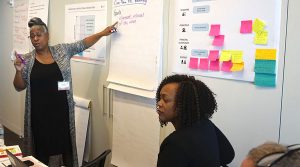Structures and Supports: Building a Throughline Approach to District Partnership
 Bank Street is committed to collaborative, systemic district reform that supports every layer of the school system so that districts are able to thoughtfully plan and implement large-scale instructional improvement initiatives to achieve maximum impact on student learning. The Bank Street Education Center has developed a “throughline” approach to district reform, designed to support districts across the system to foster conditions that enable schools to act as units of change and embed strong practices through teacher and leader teams. This Snapshot of Practice takes a closer look at the Bank Street Education Center’s throughline approach and some of the districts they have partnered with to implement district reform.
Bank Street is committed to collaborative, systemic district reform that supports every layer of the school system so that districts are able to thoughtfully plan and implement large-scale instructional improvement initiatives to achieve maximum impact on student learning. The Bank Street Education Center has developed a “throughline” approach to district reform, designed to support districts across the system to foster conditions that enable schools to act as units of change and embed strong practices through teacher and leader teams. This Snapshot of Practice takes a closer look at the Bank Street Education Center’s throughline approach and some of the districts they have partnered with to implement district reform.
Citation
Charles, J., Knecht, D., and Milby, A. (2018). Structures & supports: Building a throughline approach to district partnership. New York, N.Y.: Bank Street College of Education.
Structures and Supports Brief (pdf)
Introduces the Throughline Approach and the partnerships between three districts and the Bank Street Education Center
District One Case Study: Port City (pdf)
Presents the case study findings from the partnership with Port City School District and focuses on the essential question: What curriculum resources and accompanying teacher development supports will strengthen instruction across pre-K programs?
District Two Case Study: Lakeside (pdf)
Presents the case study findings from the partnership with Lakeside School District and focuses on the essential question: How can we build the capacity of our network teams to support standards-aligned instruction across schools?
District Three Case Study: Colonial Town (pdf)
Presents the case study findings from the partnership with Colonial Town School District and focuses on the essential question: How do current resources, practices, and supports align to developmentally meaningful, play-based, trauma-informed approaches to learning?